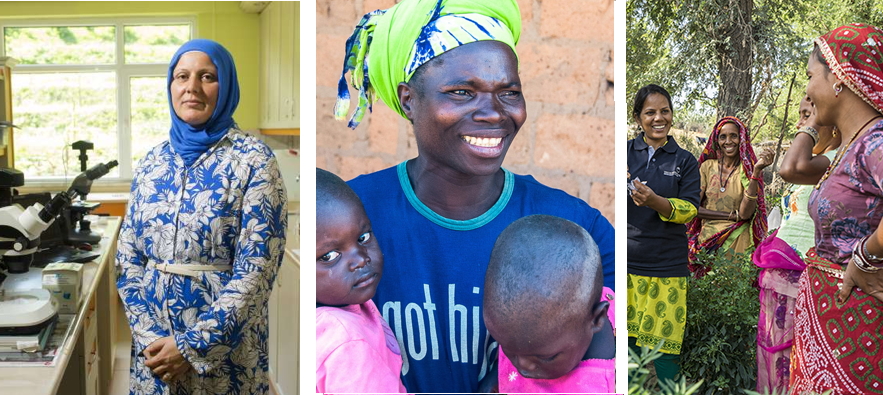Welcome to our new series “Supporter Spotlight”, where we showcase the fantastic work our supporters are doing to further sustainable agriculture worldwide. To celebrate International Women’s Day, we take a look at the programs levelling the planting field for female farmers.
1. We Farm: How single parent Clara increased her income
Clara discovered that her cow had a mineral deficiency that was making her bones weak. Through the mobile peer-to-peer advice network We Farm, Clara was advised that she should feed the cow with feeds rich with calcium and phosphorus. Another farmer also sent Clara an SMS with advice on how to grow hydroponic fodder which could help to substitute minerals in her cow feed, at a cheaper cost. Not only did she solve her problem but also learned a new skill in the process. Read more.
2. Chemonics: Towards gender equal land rights in Rwanda
Women’s ownership of land is a complex issue in Rwanda. To creatively raise awareness of gender-equal land rights, Radio Ishingiro hosted radio dramas, talk shows, quiz programs, and a series of poetry and dance competitions. With 284 men and 205 women participating in the poetry and dance competitions, Radio Ishingiro succeeded in recasting gender-equal land rights as more than a woman’s issue. Read more.
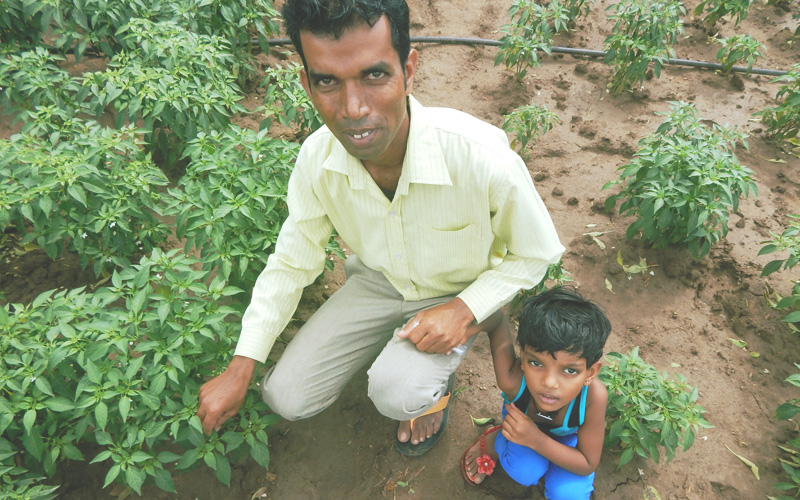
3. Fintrac: Female smallholders take on leadership roles in livestock production
Although male dominance remains high in livestock production, the Feed the Future Zimbabwe Livestock Development program is creating opportunities for more equitable participation of women and youth. The program is working to ensure that 50 percent of leadership positions will be occupied by women by 2020. To date, 39 percent of leadership positions are occupied by women. Read more.
4. IFA: Field school founder inspires youth in Nigeria
After attending trainings sponsored by IFDC’s 2SCALE project, Yinka Adesola learned how to increase farm productivity with good agricultural practices and integrated soil fertility management. She was also taught business management strategies such as marketing and selling crops. She knew she needed to inspire others with what she had learnt. “I wanted to hold other trainings to attract more youth to agriculture, to show that agriculture is a lucrative business.” Now, every three months, trainees from all around Nigeria come to her field school, the Entrepreneur Youth Multipurpose Cooperative, to learn vegetable production and farm management. Read more.
5. iDE: Empowering female farmers in Zambia
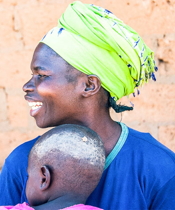
Juddy Mukumbi lives in the Meheba Refugee Camp in the northwest of Zambia. She has been working with John Muta, a Farm Business Advisor (FBA), for the past few years. With the help of her FBA, Juddy has taken on the responsibility of developing a vegetable garden, and her husband has taken on sole responsibility for the field crops. She is in charge of what to grow, how to grow it, and where to sell it. With the help of her FBA, Juddy learned to grow tomatoes, cabbage, and rape—and John connected her with markets where she can sell her produce. Read more
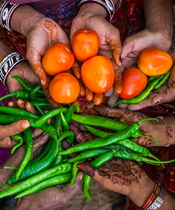 6. TechnoServe: Home gardens boost nutrition in India
6. TechnoServe: Home gardens boost nutrition in India
Women in Rajasthan, India, are using kitchen gardens to improve their families’ nutrition while redefining their role in the household. As part of TechnoServe’s Sustainable Guar Initiative, a study identified health and nutrition as key opportunities to raise community awareness and promote inclusion of women in farming households. TechnoServe formed a team of women field extension officers, who, armed with a comprehensive training package, began holding training sessions on how to sustain a home garden growing nutrient rich vegetables. As of October 2016, the Sustainable Guar Initiative has trained 320 women and established 277 home gardens. Read more
7. Farm Africa: Keeping cattle, and families healthy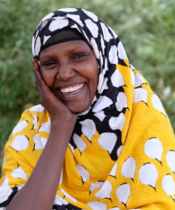
Farm Africa has been helping women and young people increase their incomes and improve their nutrition standards for many years, through activities such as beekeeping, goat rearing and poultry farming as well as developing fruit and vegetable orchards on rehabilitated land. For Kaamila, who lives in the Bale Eco region of Ethiopia, FarmAfrica’s support in establishing rotational grazing patterns for her co-operative’s livestock has meant her cattle are stronger and healthier than before – meaning Kaamila and her family are too. Read more
8. One Acre Fund: The house that maize built
Kija Katemana had only ever used local seeds and a little fertilizer to grow maize on her three-acre farm in Tanzania. Her harvest was never enough to feed her family. In 2013, she joined One Acre Fund, which gave her access to better seeds and taught her how to space her crops and the right amount of fertilizer to use. Now, not only has Kija been able to provide food for her family year-round, but she’s also made investments. In 2014, she sold a portion of her harvest and bought her own quarter acre of farm land. The next year, she built her own house! Read more.
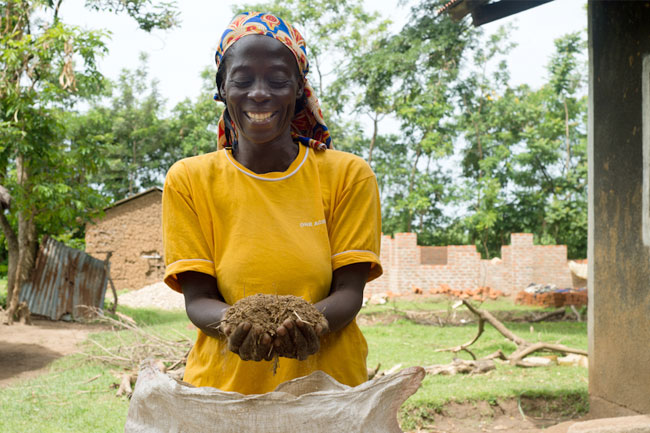
9. HarvestPlus: Mothers in Bangladesh choose zinc rice
In Bangladesh, 41 percent of children aged under five are zinc deficient, leading to a range of health problems. A new variety of rice—the country’s most popular staple food—is bringing hope to families. Zinc-rich rice is now available in the country, thanks to the Bangladesh Rice Research Institute (BRRI), HarvestPlus, and other partners promoting this biofortified nutritious crop. Women are leading the adoption of the crop, and Khairul Bashar, the HarvestPlus Country Manager for Bangladesh, has a story of one particular woman’s determination to improve her son’s health through zinc rice. Read more.
10. AgDevCo: Preparing entrepreneurs for export market
Isabel Vilanculos runs Westfalia Fruto – a Mozambican avocado business set to be amongst the first to sell into the EU market, thanks to investments from AgDevCo. Earnings from litchi exports have been invested in irrigation, which she expects will double revenue this year and represents a first step towards transforming Mozambique into a fruit exporting country. “My business aspirations have been transformed and so has my family’s livelihood.” Read more.
11. IFDC: Innovations liberate female farmers in Benin
Pineapple production provides a profitable opportunity for thousands of Beninese small-scale producers, like Sylvie Affon-Amonmi. But low levels of education, the scarcity and high cost of farm labour for weeding and the cost of fertilization of pineapple plots is hindering production. The IFDC project 2SCALE and its partners introduced learning plots to observe and offer best practices for weed control and fertilizer application, which has transformed the way the women work. Read more.
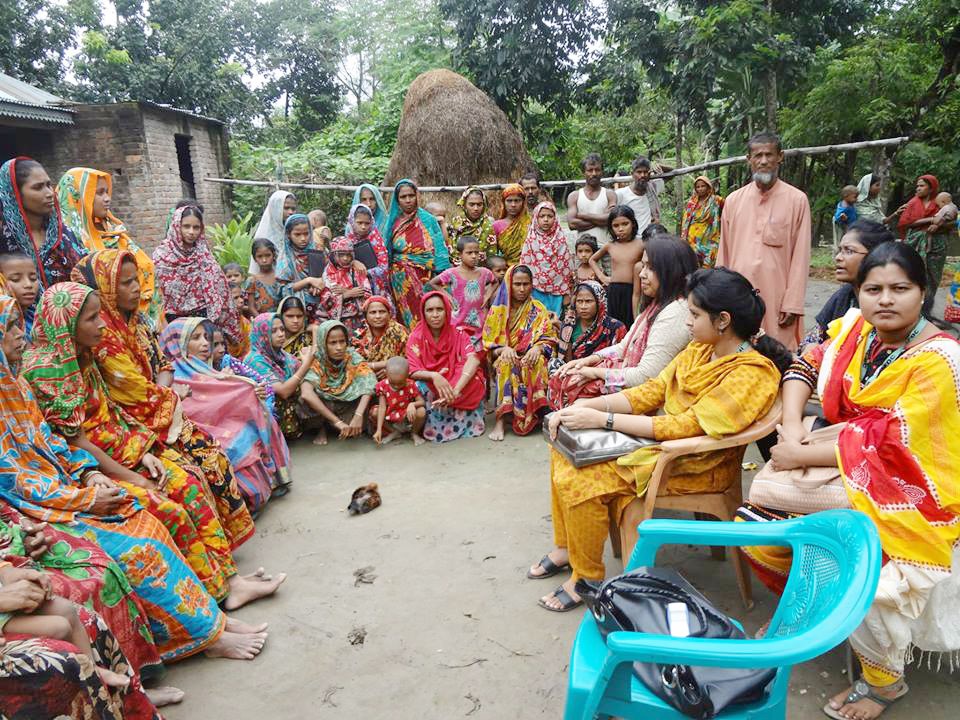
12. Root Capital: Paying university fees with drought resistant sorghum
Janet Karea Mutuura was struggling to make a living in Meru, Kenya, until a new group called Sorghum Pioneer Agencies came to town. Funded by a loan from Root Capital, Sorghum Pioneer Agencies brought a drought resistant variety of sorghum to the region, and collected farmers’ harvests to sell on in bulk. They also provided training and small loans for farmers. Janet’s hard work growing sorghum is now paying off: “I built a good, permanent house,” she says, “then I built a nice gate for my home. Best of all, I used the sorghum money to educate my children in higher learning institutions… and now they all have jobs!” Read more.
13. Self Help Africa: A new beginning in Burkina Faso
For Binta from Burkina Faso, having access to a dry, ventilated storage facility for her onions has contributed to a quadrupling of her income. By joining a Self Help Africa project, she has also received training and improved seeds, which enabled her to grow more and diversify her crops. Today she is growing rice, peanuts, beans, cabbage, local cereals such as millet, and onions. “In the past we didn’t grow enough food to last for the whole year and had to ask other people for help. Today, I grow enough food to feed my family all year round,” she said. Read more.
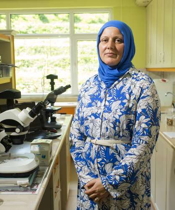 14. CropLife: Protecting Turkey’s Hazelnut Supply
14. CropLife: Protecting Turkey’s Hazelnut Supply
Turkish plant scientist Arzu Sezer has been looking for effective ways to combat the grey mould that affects hazelnuts for the last three years. Hazelnut has been a key crop for centuries – in fact, today eight out of every 10 hazelnuts consumed around the world is grown in Turkey. Using the most effective fungicides, Arzu’s team is currently conducting four trials that are focused on finding the optimal time for farmers to apply crop protection products so that they use the least amount possible while remaining effective. Read more.
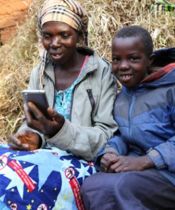
15. World Vision: Putting an agronomist in farmers’ pockets
Marguerite has been struggling to raise her four children after her husband died. Land contraction, lack of fertilizers, better seeds and farming technics were the issues preventing her from harvesting enough to care for her family until recently. That is, until World Vision Rwanda introduced “e-Hinga” (meaning e-Farming in the local language) – a technology providing agronomic services through recordings sent to mobile phones. It is as if the farmers now have an agronomist in their pocket, giving advice. Marguerite saw her production of beans double since she began accessing the app. She can now harvest up to 200kg, on her small plot of land. Read more.
16. Shamba Shape Up: Boosting profits with conservation agriculture
The Shamba Shape Up crew visited Theresia’s farm recently, where she grows maize and mangos, and keeps cows, goats and poultry. She and her daughter Alice wanted to learn how to boost their profits through Conservation Agriculture, and the team were only too happy to show her how. Read more.
17. CNFA: Agro-inputs training for women
Cultivating New Frontiers in Agriculture (CNFA) is currently implementing the USAID/Agro-Inputs Project (AIP) in Bangladesh. The effort has been a broad success, not only for men, but also for women. Through the creation of a local Agro-Input Retailers Network (AIRN), AIP now provides funding, training, and technical advice to more than 3,000 retailers selling inputs such as seed and fertilizer – including more than 200 women in what previously had been an almost entirely male-dominated sector. Read more.
